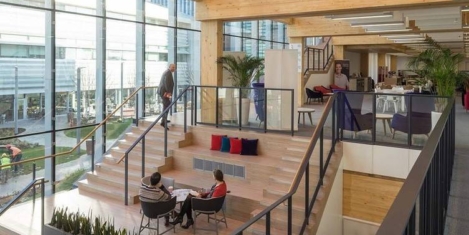October 11, 2018
How the media oversold standing desks as a fix for inactivity at work
 Sitting is so culturally ingrained at work, at the wheel, in front of the TV and at the movies, it takes a great effort to imagine doing these things standing up, let alone pedalling as you work at a bike desk. So, when the world’s first specific guidelines on sitting and moving at work were published, they generated headlines such as: Abandon your chair for four hours to stay healthy, office workers are told and: Stand up at your desk for two hours a day, new guidelines say. But what many media reports did not mention was the guidelines were based on limited evidence. They were also co-authored by someone with commercial links to standing desks (desks you raise and lower to work at standing or sitting), a link not declared when the guidelines were first published in a journal. Media reports also overplayed the dangers of sitting at work, incorrectly saying it wiped out the benefits of exercise. Our new study reveals the nature of this media coverage and its role in overselling standing desks as a solution to inactivity at work.
Sitting is so culturally ingrained at work, at the wheel, in front of the TV and at the movies, it takes a great effort to imagine doing these things standing up, let alone pedalling as you work at a bike desk. So, when the world’s first specific guidelines on sitting and moving at work were published, they generated headlines such as: Abandon your chair for four hours to stay healthy, office workers are told and: Stand up at your desk for two hours a day, new guidelines say. But what many media reports did not mention was the guidelines were based on limited evidence. They were also co-authored by someone with commercial links to standing desks (desks you raise and lower to work at standing or sitting), a link not declared when the guidelines were first published in a journal. Media reports also overplayed the dangers of sitting at work, incorrectly saying it wiped out the benefits of exercise. Our new study reveals the nature of this media coverage and its role in overselling standing desks as a solution to inactivity at work.







 Today is World Mental Health Day and new research from Bupa has found that concerns over mental health is not confined to adults, as a third of employees say they worry about their children’s mental health while at work. The research, conducted among working parents of 4-18 year olds reveals that children’s mental health is among parents’ greatest concerns, on par with physical health and academic performance. The only concern that ranks higher is future financial prospects.
Today is World Mental Health Day and new research from Bupa has found that concerns over mental health is not confined to adults, as a third of employees say they worry about their children’s mental health while at work. The research, conducted among working parents of 4-18 year olds reveals that children’s mental health is among parents’ greatest concerns, on par with physical health and academic performance. The only concern that ranks higher is future financial prospects. 
 The majority of employees (77 percent) agree that people should take proactive steps to manage their mental health a new survey has revealed. Of those surveyed, the vast majority felt that there is increased awareness about mental health (87 percent) and that people are more willing to talk openly about mental health issues than they were a few years ago (82 percent). The impact of high-profile people speaking out about their own mental health challenges was believed to be the biggest influencing factor, cited by more than half (53 percent) of respondents.
The majority of employees (77 percent) agree that people should take proactive steps to manage their mental health a new survey has revealed. Of those surveyed, the vast majority felt that there is increased awareness about mental health (87 percent) and that people are more willing to talk openly about mental health issues than they were a few years ago (82 percent). The impact of high-profile people speaking out about their own mental health challenges was believed to be the biggest influencing factor, cited by more than half (53 percent) of respondents. 
 Employee motivation levels appear to be the decline, with 29 percent of employees surveyed saying they were not motivated at work in 2017 compared to just 18 percent who said the same in 2016 the research report, “Living to Work” has claimed. Motivates Inc. has commissioned its employee motivation research for the past three years, surveying over 2,000 UK employees in full-time employment. The full data shows like-for-like how employees are feeling in the workplace and what hygiene factors have affected behaviours year-on-year. According to the latest data 71 percent of UK employees were motivated in 2017, which on its own shows a positive result, yet when you look at the motivational statistics from 2016 the data actually shows the percentage of motivated employees has dropped by 11 percent in just one year. That’s 220 more employees in an organisation of 2,000 who are not feeling good about their job.
Employee motivation levels appear to be the decline, with 29 percent of employees surveyed saying they were not motivated at work in 2017 compared to just 18 percent who said the same in 2016 the research report, “Living to Work” has claimed. Motivates Inc. has commissioned its employee motivation research for the past three years, surveying over 2,000 UK employees in full-time employment. The full data shows like-for-like how employees are feeling in the workplace and what hygiene factors have affected behaviours year-on-year. According to the latest data 71 percent of UK employees were motivated in 2017, which on its own shows a positive result, yet when you look at the motivational statistics from 2016 the data actually shows the percentage of motivated employees has dropped by 11 percent in just one year. That’s 220 more employees in an organisation of 2,000 who are not feeling good about their job.
 At the
At the




 National Work Life Week (1st – 5th October 2018) starts today with the aim of encouraging companies to think about their employees’ wellbeing and happiness. To mark the week new research asked British workers about the things they most want from their work. The YouGov survey of 2,000 adults, commissioned by the Oxford Open Learning Trust, found that while money is predictably the biggest motivator behind career choice (64 percent), over half of the respondents cited working hours and flexible working as an important factor (55 percent).
National Work Life Week (1st – 5th October 2018) starts today with the aim of encouraging companies to think about their employees’ wellbeing and happiness. To mark the week new research asked British workers about the things they most want from their work. The YouGov survey of 2,000 adults, commissioned by the Oxford Open Learning Trust, found that while money is predictably the biggest motivator behind career choice (64 percent), over half of the respondents cited working hours and flexible working as an important factor (55 percent). 

















October 5, 2018
Developing a resilient mindset to cope with stress
by Portia Hickey • Comment, Wellbeing
More →